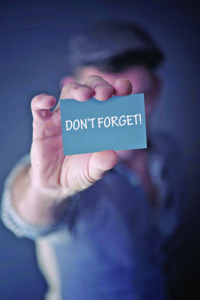Are You ‘Cheating’ By Using Memory Cues?

© wernerimages | Getty Images
Relying on memory cues will actually allow you to hold on to more information and may give you more confidence in your ability to recall information when having conversations, making plans, organizing your work, and remaining independent.
You might like to think that your brain should be able to keep track of all of your obligations, appointments, finances, and other responsibilities without having to rely on calendars, lists, and other memory cues and reminders.
But let’s face it, shopping lists and daily planners have been keeping us organized for a long time. And yet, if you’re working to keep your mind as sharp as possible, you may wonder if you’re cheating or taking the easy way out by leaning on physical reminders or mental tricks to help you remember.
You may also wonder if the use of technology or pen-and-paper reminders may actually hasten cognitive decline, the way taking the elevator doesn’t help your cardiovascular health the way the stairs do.
Rather than look at memory cues as signs of diminishing brainpower, Massachusetts General Hospital neuropsychologist Christina Kay, PhD, suggests that these strategies should be viewed as tools necessary to get a job done. “Using memory cues to help remember information is far from ‘cheating,’” she says. “In fact, using memory cues demonstrates a high level of problem-solving to increase our capacity to encode and retain information.”
In other words, memory cues—objects, events, or mnemonic devices that trigger the recall of information—actually allow you to learn more and remember more when the time comes.
Another way to think about memory cues is that they can help take care of the routine information stored in your memory that might otherwise interfere with more complex cognitive tasks. When you had to write a research paper in school, your priority was answering challenging questions and making strong, layered arguments. So using a dictionary, thesaurus, and other reference materials simply freed up more mental energy to focus on the big picture.
Get in the Habit
Throughout your life you’ve no doubt created a few memory cues of your own and relied on those that seem universal. Think of how often we still remind ourselves to “spring forward, fall backward” when setting and resetting the clocks for Daylight Saving Time.
In order to use self-generated memory cues on a regular basis you need to find a strategy that you can practice without it becoming more trouble than it’s worth. “The best way to get into the habit of using memory cues regularly is to develop a routine and use self-generated, personal cues that strike the balance between serving as an effective reminder while being convenient enough that you use it consistently,” Dr. Kay advises. “Experiment with different methods of memory cues to see what works well for you. Once you find an effective method, use it often in a variety of contexts. For example, you may find that chunking works well for you when running errands, house cleaning, or packing for a trip.”
And keep in mind that memory cues, lists, and poems like, “Thirty days hath September…” or “In 1492, Columbus sailed the ocean blue,” are nothing new. Since your days as a student, you’ve probably been happy to have them at your disposal when trying to keep track of information, dates, lists, and other material. They are essential to learning and staying organized, so never feel guilty about finding a new way to solidify new information and keep old information at the ready.
“We inherently use memory cues all the time and probably have been doing so since we began to engage in learning,” Dr. Kay says. “Think of learning about ‘Roy G. Biv’ when learning the colors of the rainbow (red, orange, yellow, green, blue, indigo, and violet). With age, we may need to adjust our cues or use them more consistently, but the methods are similar to what you’ve probably used all your life.”
The post Are You ‘Cheating’ By Using Memory Cues? appeared first on University Health News.
Read Original Article: Are You ‘Cheating’ By Using Memory Cues? »

